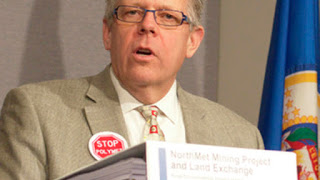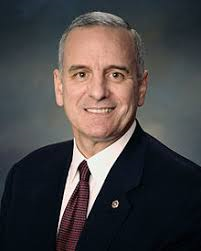Archive for the ‘Minnesota Environmental Partnership’ Category
Thank God for President Trump’s regulators. After years of neglecting the riff-raff that serve as regulators, President Trump is installing a new breed of regulator. I’m certain it’s a shock to the environmental activists who’ve ruled the roost the last generation. That’s why it’s essential to clean out the barn and install new regulators that believe in the rule of law and the Constitution.
One of the people who’s likely to be a new regulator is a Wyoming woman named Karen Budd-Falen. It’s likely that she’ll be “the next leader of the Bureau of Land Management.” According to the article, “Budd-Falen has worked extensively for private property owners, agricultural operations and local governments.” Trent Loos, a Nebraska rancher and the host of a radio show Rural Route, said of Budd-Falen “There’s no doubt why people who oppose multiple use and following the law as it’s written would be opposed to Karen Budd-Falen. She believes in the Constitution the way it was written that guarantees multiple use. Not just rancher use but multiple use.”
Later, Loos said “It’s important to point out that she was railing on the BLM when (the Obama Administration was) against multiple use. That’s why she was raising a stink. We’ve had administrations moving away from multiple use not maintaining it. That’s why she went after the BLM so many times.”
That’s why we should expect lots of theatrics by the Democrats. Think of her as a tough-as-nails female version of Scott Pruitt. Needless to say, environmental activists are freaking out:
“This is probably one of the worst picks he could possibly come up with to head the BLM,” explained Athan Manuel, director of the Sierra Club’s Lands Protection Program. “She’s very ideological, and does seem to be completely offended by the concept of federal lands,” he added.
What’s funny is that the Sierra Club is upset that Budd-Falen is using the same tools that environmental activists have used against power companies:
But Budd-Falen’s approach was to destroy Ratner and Western Watersheds through this nuisance lawsuit accusing him of trespassing. She hardly even tried to hide her intentions, reportedly bragging in 2015 to a group of ranchers that “one of the funniest things I’m doing right now” is that she “figured out a way to sue Western Watersheds Project.”
How is that different than MCEA suing the investors of the Big Stone II power plant? Back then, Paul Aasen bragged about his tactics:
Along with our allies at the Izaak Walton League of America, the Union of Concerned Scientists and Wind on the Wires, the Minnesota Center for Environmental Advocacy and Fresh Energy argued, first in South Dakota, then before the Minnesota Public Utilities Commission (PUC), that the new plant was a bad idea. Our message was simple: The utilities had not proven the need for the energy, and what energy they did need could be acquired less expensively through energy efficiency and wind.
We kept losing, but a funny thing happened. With each passing year, it became clearer that we were right. In 2007, two of the Minnesota utilities dropped out, citing some of the same points we had been making. The remaining utilities had to go through the process again with a scaled-down 580-megawatt plant.
These environmental parasites don’t care about the environment. They care exclusively about their extremist agenda.
They’re just upset that someone’s using their tactics against them.
The environmentalists’ newest dog-and-pony show, aka the Enbridge Line 3 Pipeline Project, hearings start this week. It’s guaranteed that environmental activists will turn out in big numbers, thanks to the Dayton-Rothman Commerce Department’s gift.
When the Commerce Department provided testimony to the Public Utilities Commission, they said that “the project isn’t needed and won’t benefit Minnesota.” I question the validity of that testimony since it closely resembles the statements made by Steve Morse, the executive director of the Minnesota Environmental Partnership, about the Pipeline project. That’s basis enough to question whether the Dayton-Rothman Commerce Department is essentially being run by special interest organizations opposed ideologically, not scientifically, to the project.
In their testimony, the Dayton-Rothman Commerce Department states that refineries are running near capacity, which, in their opinion, is proof that another pipeline isn’t needed. Why doesn’t the Commerce Department and the Minnesota Environmental Partnership think that that’s proof that we need to increase refining capacity, not reduce pipeline capacity?
The testimony is short-sighted in another way. Does anyone think that this oil won’t get shipped via a different pipeline if this pipeline project is rejected? If the PUC rejects this pipeline project, will the oil company simply shut down their operations in Alberta? Or will they simply start working with a different state to build a different pipeline? I’d submit that the latter scenario is most likely.
If that’s the case, why would the DFL shortchange construction unions and Minnesota’s small towns in northern Minnesota? Should this man essentially have a 1-man veto over infrastructure projects?
The DFL frequently accuses Republicans of ignoring science. Isn’t that what the DFL is doing in opposing this project? After all, Republicans aren’t foolish enough that fossil fuel usage has leveled off and will start declining. That’s what Gov. Dayton’s Commerce Department and the MEP argue. The chances of that happening are remote. The chances of the MEP’s predictions being accurate are even more unlikely.
In the first 4 parts of this series (found here, here, here and here), I focused on different facets of the inadequacies of the Dayton-Rothman Commerce Department. I categorized each of the shortcomings and culprits. Most importantly, I identified the opportunities that the Dayton-Rothman Commerce Department missed and why.
This article will pull everything together so we can put together a less hostile, more business-friendly set of policies that doesn’t sacrifice the environment. First, we’ll need to streamline the regulatory review process so hostile environmental activists don’t have multiple opportunities to throttle key infrastructure projects. Whether we’re talking about killing the Sandpiper Pipeline project, the constant attempts by the Sierra Club, Conservation Minnesota and Northeastern Minnesotans for Wilderness to kill both the Twin Metals and the PolyMet projects or the Public Utilities Commission and the Dayton-Rothman Commerce Department, it’s clear that the DFL is openly hostile to major infrastructure projects.
It’s long past time to get the PUC out of the public safety/transportation business. Similarly, it’s time to get the Commerce Department out of the environmental regulatory industry. Public safety and transportation belong in MnDOT’s purview, not the PUC’s. Environmental regulations need to be significantly streamlined, then shipped over to the DNR. There should be a period for fact-finding and public comment. There should be the submitting and approval/disapproval of an Environmental Impact Statement and the submitting and approval/disapproval of an Economic Impact Statement.
Further, laws should be changed so that there’s no longer a requirement to submit an application for a “certificate of need.” In effect, that’s a bureaucratic regulatory veto of major infrastructure projects. That isn’t acceptable. There should be a time limit placed on the bureaucrats, too. They should have to accept or reject applications within a reasonable period of time. That’s because regulators have sometimes used delaying tactics to throttle projects without leaving a paper trail. It’s also been used to deny companies the right to appeal rulings. (If there isn’t a ruling, there isn’t an appeal.)
Third, streamlining the review process limits the opportunities for environmental activists to kill projects like those mentioned above. There’s a reason why it’s called the Commerce Department, not the Department of Endless Delays and Excessive Costs, which is what it’s become. Eliminating the PUC’s oversight responsibilities, especially in terms of approving certificates of need, will eliminate the impact that environmental activists serving on that Board can have in killing or at least delaying major infrastructure projects.
Fourth, it’s important that we bring clarity and consistency to this state’s regulatory regime. The system Minnesota has now breeds uncertainty. That steals jobs from Minnesota because companies attempt to avoid Minnesota entirely whenever possible. While we want to preserve our lakes, rivers and streams, we want to preserve our middle class, too. The environment shouldn’t be put on a pedestal while communities die thanks to a dying middle class.
I’ve seen too often how once-proud parts of Minnesota that have a heavy regulatory burden have seen their middle class essentially disappear. Cities like Virginia and Eveleth come to mind. It’s immoral to give a Twin Cities agency the authority to kill Iron Range communities. That’s literally what’s happening right now.
For the last 7 years, Gov. Dayton has run an administration that’s of, by and for the environmental activist wing of the DFL. If you work in a construction union, you haven’t had a great run. That isn’t right. People who work hard and play by the rules should be able to put a roof over their family’s head, set money aside for their kids’ college education and save for their retirement. For far too many people, that hasn’t happened recently.
The next Republican governor should implement these changes ASAP. It’s time to destroy the Dayton ‘Hostile to business’ sign and replace it with an ‘Open for business’ sign. It’s time to get Minnesota government working for everyone once again.
Technorati: Mark Dayton, Public Utilities Commission, Mike Rothman, Environmental Activists, Certificate of Need, Special Interests, Regulatory Regime, DFL, Infrastructure, Sandpiper Pipeline Project, Enbridge Line 3 Pipeline, Construction Unions, Transportation, Public Safety, Republicans
If people needed a better example of how hostile the Dayton administration is to robust economic growth, they needn’t look further than Gov. Dayton’s Commerce Department. When Gov. Dayton’s Commerce Department testified that the Enbridge Line 3 Pipeline wasn’t needed, they testified that they were anti-commerce. When the Commerce Department testified to that, the DFL quietly applauded. They knew that it essentially killed approval of that pipeline’s replacement at least through the end of Gov. Dayton’s administration.
Listen to the certainty of the Commerce Department statement. They said “‘In light of the serious risks and effects on the natural and socioeconomic environments of the existing Line 3 and the limited benefit that the existing Line 3 provides to Minnesota refineries, it is reasonable to conclude that Minnesota would be better off if Enbridge proposed to cease operations of the existing Line 3, without any new pipeline being built,’ the agency wrote in testimony submitted to the Public Utilities Commission on Monday, Sept. 11.”
In the next paragraph of the article, it states “The testimony, written by Kate O’Connell, manager of the Energy Regulation and Planning Unit of the Department of Commerce, comes ahead of evidentiary hearings on the oil pipeline replacement that will see the project debated in a trial-like setting in November. A new round of public hearings across the state will kick off at the end of the month.”
It’s time to ask a foundational question. Shouldn’t Minnesotans to expect the state government’s Commerce Department to be pro-commerce? There’s no question that the Dayton/DFL Commerce Department isn’t pro-commerce. Ms. O’Connell’s testimony settled that matter.
Here’s another foundational question Minnesotans should ask: who should have the final say on multi-billion dollar projects? Why should the Public Utilities Commission and the Commerce Department have the final say on whether projects should be approved? Further, what makes the Commerce Department and the PUC experts on things like public safety and transportation?
Those are the only things that government should be involved in. When Gov. Dayton’s Commerce Department testified that there wasn’t a need, they didn’t testify as to whether their testimony hurt public safety. It does from the standpoint of forcing more oil onto oil trains. More oil on more oil trains is already causing cities through which these railroad tracks run to come up with evacuation plans. That costs each of those cities tons of money in their annual operating budget. That, in turn, leads to higher property or sales taxes.
This is a multi-part series. This is a subject that’s too important not to examine in depth.
Technorati: Commerce Department, Mark Dayton, Enbridge Line 3 Pipeline, Public Utilities Commission, Kate O’Connell, DFL, Public Safety, Transportation, Property Taxes, Oil Trains
Saying that MEP, aka Minnesota Environmental Partnership, is dishonest and biased when it comes to fossil fuels is understatement. In their statement about the Dayton Department of Commerce testimony to the Public Utilities Commission, Steve Morse, MEP’s Executive Director, admitted that MEP hates fossil fuels.
He admitted it when he said “The age of growth in fossil fuel demand is over. We don’t need increased fossil fuel capacity. Instead, We need to get about the business of abandoning and cleaning up the existing Line 3.” That’s a pretty stunning statement, especially considering the fact that natural gas will be needed for at least three-fourths of this century to replace coal-fired power plants for baseline energy generation.
In MEP’s official statement, Morse also said “We commend the Department of Commerce for taking a hard look at the data and carefully considering the criteria that are in law for this type of project. The Department found that this pipeline is not needed for Minnesota, that it does not benefit Minnesota, and is not good for Minnesota.”
That’s a narrow-minded view of things. First, legislators from northwest Minnesota have criticized the Minnesota Department of Commerce for their narrow-minded perspective:
“Gov. Mark Dayton’s administration is ‘siding with environmental extremism instead of common sense.’ ‘Shutting down this pipeline will have a substantial impact on rural Minnesota’, Fabian said in the statement. ‘Our local counties, school districts and townships will lose critical property tax revenue, and what’s more, jobs will be affected and there will be fewer workers patronizing local businesses like our grocery stores and motels. Plain and simple, bureaucrats in St. Paul are advancing policies that hurt Greater Minnesota.’”
Friday night on Almanac, Steve Morse debated Cam Winton on the merits of the pipeline. The arguments made by Steve Morse weren’t totally without merit. They weren’t the least bit persuasive, either. I’ve been watching environmentalists for 40+ years. In that time, their statistics and ‘facts’ have been consistently inaccurate. The notion that we’re starting to use less fossil fuels is preposterous. Yes, we’re driving more fuel efficient cars. Yes, car manufacturers are manufacturing more hybrids. No, society isn’t reducing the amount of gasoline we’re using. Watch the video of the interview, which starts approximately 5 minutes in:
Technorati: Steve Morse, Minnesota Environmental Partnership, Mark Dayton, Minnesota Department of Commerce, Minnesota Public Utilities Commission, Special Interests, DFL, Cam Winton, Chamber of Commerce, Enbridge Line 3 Pipeline



